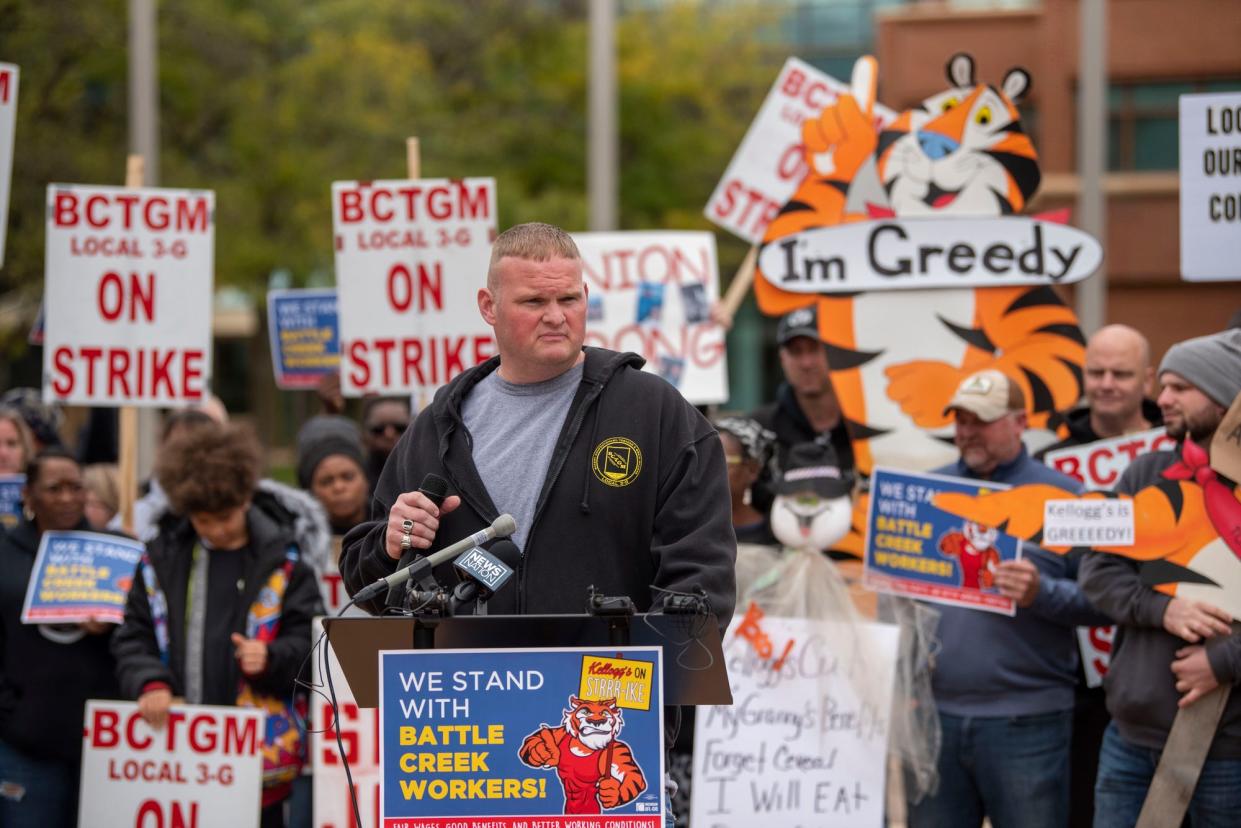Union leaders reject Kellogg Co. 'last best final offer' as strike continues

- Oops!Something went wrong.Please try again later.
Leaders from Kellogg Co. and the Bakery Confectionery Tobacco Workers and Grain Millers union wrapped up two days of negotiations in Virginia on Wednesday but did not reach an agreement on a new master contract.
Some 1,400 workers at the Battle Creek-based company's four ready-to-eat cereal plants have been on picket lines since walking off the job Oct. 5, and remain on strike after the union rejected Kellogg's "last best final offer."
According to the company's website detailing negotiations, kelloggnegotiations.com, it is no longer proposing a two-tiered employment structure. Instead, it is offering to continue the current pathway to "legacy" wages and benefits, including pensions, with wage increases for current and future "transitional" employees and enhanced benefits for all employees.
The proposed wage increases include $2-to-$5 per hour wage increases for transitional workers — depending on years of service — and a 3% increase for legacy workers upon ratification. The company stated that the average 2020 earnings for the majority of its ready-to-eat cereal employees was $120,000.
"This is our 'Last Best Final Offer' to the union," the company wrote Nov. 3. "The company remains ready and willing to consider any realistic offers from the union."
In its statement via bctgm2021rteccontract.com, the BCTGM negotiating committee wrote, "That offer did not achieve what we were asking, a pathway to fully vetted workers without takeaways. The company said they would get off their 2-tier and get to a pathway, but they could not find a fully benefited way to achieve this. With this issue, we were unable to address the other items that are still on the table. We cannot recommend this offer and will not bring it back to membership to vote on. We agreed that we will not have concessions and that is all their last offer was."
The two sides had been at the bargaining table since September after extending the 5-year master contract for one year in October 2020.

Amid the strike, the company has turned to "third-party resources" and salaried employees to continue operations at its ready-to-eat cereal plants in Battle Creek; Memphis, Tennessee; Lancaster, Pennsylvania; and Omaha, Nebraska.
On Thursday, Kellogg Co. reported a third-quarter profit of $307 million, beating Wall Street expectations. The company posted revenue of $3.62 billion in the period that ended Oct. 2.
Cereals accounted for about 40% of the company's net sales in 2020, with a surge in demand amid the pandemic. However, the company reported organic net sales for cereal in North America was down 7% year-over-year for the third quarter, and for the first three quarters of 2021, organic net sales were down 10.8% over 2020.

"We have one particular area that is more challenging than others, and that's our cereal business," Kellogg CEO Steve Cahillane said on Thursday's earnings call. "And that's obviously being compounded because of the strike."
Kellogg's was founded by Will Keith Kellogg in 1906 as "Battle Creek Toasted Corn Flake Company." As of 2020, the company had some 31,000 employees worldwide.
Contact reporter Nick Buckley at nbuckley@battlecreekenquirer.com or 269-966-0652. Follow him on Twitter:@NickJBuckley
This article originally appeared on Battle Creek Enquirer: Union leaders reject Kellogg Co. 'last best final offer'

